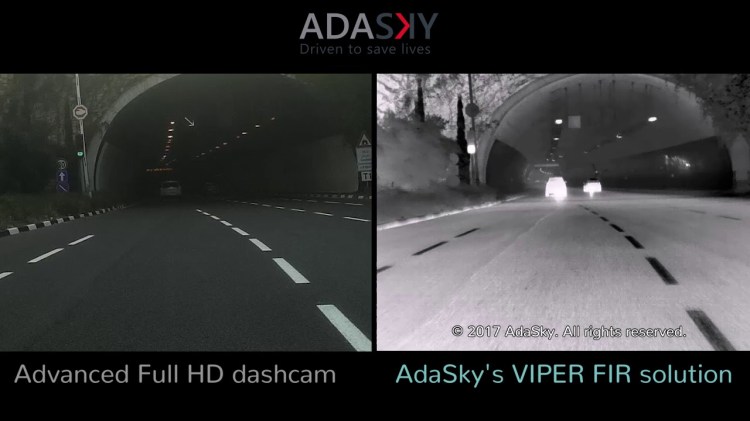Watch all the Transform 2020 sessions on-demand here.
In October 2017, two-year-old Israeli startup AdaSky emerged from stealth with what it claimed was the first far-infrared (FIR) thermal cameras explicitly designed for driverless cars. Its Viper platform would enable carmakers to clear fully autonomous milestones much more quickly than with conventional sensor packages, AdaSky promised, and it would enter mass production by 2021.
After the better part of a year, AdaSky appears to be well on its way to achieving that goal. The startup today revealed that it has secured $20 million from South Korean automotive components manufacturer Sungwoo Hitech as part of a larger funding round. AdaSky CEO Yakov Shaharabani said it’ll enable the company to expand its team of engineers, many of whom have backgrounds developing thermal cameras for military equipment.
“We are thrilled to partner with Sungwoo Hitech for their resource and guidance in the South Korean market, and globally,” he said, adding that AdaSky plans to announce new features and integrations at the upcoming 2019 Consumer Electronics Show in Las Vegas. “This funding will allow us to rapidly scale to meet the global market pull for our technology.”
AdaSky’s 0.3-megapixel (640 x 480 pixels), 4.3 centimeter x 2.6 centimeter solid-state Viper sensor, which contains no moving parts, operates continuously at 60 frames per second and can passively collect heat signals from objects as far as several hundred meters away at a sensitivity of 0.05 degrees Centigrade. (AdaSky says it can determine whether said object is a person at 200 meters away, and from even further away for larger objects, like cars.) Using computer vision algorithms running on a dedicated image signal processor (ISP) and application-specific integrated circuit (ASIC), Viper’s able to record and detect the thermal signatures of animals, pedestrians, cyclists, and other hazards, and to work in concert with other sensors to provide navigational support in inclement conditions.
June 5th: The AI Audit in NYC
Join us next week in NYC to engage with top executive leaders, delving into strategies for auditing AI models to ensure fairness, optimal performance, and ethical compliance across diverse organizations. Secure your attendance for this exclusive invite-only event.

Above: The Adasky Viper.
The advantages of radar are myriad, AdaSky contends. Unlike lidar sensors — which tend to perform poorly in fog, snow, and rain — and radar — which produces coarser mapping data than other sensors — infrared sensors can detect extremely subtle differences in heat emitted by pedestrians, vehicles, and other objects on the road, regardless of the weather’s severity. As an added benefit, they’re not susceptible to overexposure caused by bright lights, which can temporarily blind RGB cameras.
AdaSky isn’t without competition. Oregon-based Flir Systems, one of the largest producers of thermal imaging cameras and sensors in the world, last year announced a VGA sensor designed for self-driving cars that it said had already been shipped to manufacturers for testing.
But Viper’s investors — including Sungwoo Hitech chair and co-CEO Myung-Keun Lee — aren’t rattled. That’s perhaps because the global infrared sensors market is expected to reach a whopping $20.82 billion by 2024, according to Research and Markets.
“Viper is the smallest highest-resolution thermal camera for autonomous vehicles on the market. We strongly believe that AdaSky’s technology will enable 24/7 sight and perception for vehicles and put us all on the path to fully autonomous driving,” Lee said. “Our investment in AdaSky strengthens our capabilities in supplying key technology for OEMs of autonomous vehicles, which is vital for our long-term growth in the automotive market.”


